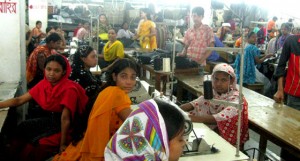March is Women’s History Month, an annual celebration of the successes of women globally, which really needs a dose of reality as it is a major failure in terms of sustainability. It is important to honor trailblazers in the women’s movements who have overcome major challenges and prevailed against adversity and apathy relative to sexism and the lack of economic parity, especially in the United States. However, it is equally important that we remain mindful of the plight of so many people globally, particularly women and children in emerging economies, working in sweatshops under horrendous conditions without receiving a living wage.
In recognition of Women’s History, we choose to recount the tragedy in New York at the Triangle Shirtwaist Factory on March 25, 1911 in which 123 young women and 23 men died in a factory. They were unable to exit the building primarily because of locked exit doors. This fire and loss of life sparked and outrage that prompted factory workers to organize and demand safe working conditions. By 1938, the United States was free of sweatshops.
The outrageous part of this story is that despite this tragedy, sweatshops still exist in other parts of the world, such as Bangladesh. The workers in many of these sweatshops work 12 to 14 hours a day, 7 days a week and only get 1 day off per month. Their wages are significantly less than $1.00 per hour. Just think– these people are making the garments that are exported to the United States for companies such as Wal-Mart, K-Mart and Gap.
What We Can Do
It simply is not enough to commemorate the past successes of women during the month of March or Women’s History Month. We each need to do out part to adopt an awareness of the plight of women and children in emerging nations who are forced to work in sweatshops to provide for their families. We should commit to sustainable living, which first and foremost includes the “human factor.” We are all connected in this world. We have the option of buying food, clothing and other necessities from businesses that endorse principles of “fair trade.”
We owe it to ourselves and the world community to support legislation that bans the import of child labor goods to the United States. With all the information available on the Internet, we encourage you to do a little homework before going out to shop to ensure that you are dealing with businesses who support fair trade. Also, when voting in elections, please consider the candidates’ stand on fair trade legislation before casting your vote.
So, today in honor of the victims of the Triangle Shirtwaist Factory fire, we hope that each of you commit to a life of awareness and sustainability. It is up to each of us to destroy the global sweatshop economy. To do so is to live green, be green.
________________
Resources:
1. http://www.upworthy.com/over-100-years-ago-123-young-women-working-in-a-factory-never-came-home-it-changed-our-country?c=ufb1




